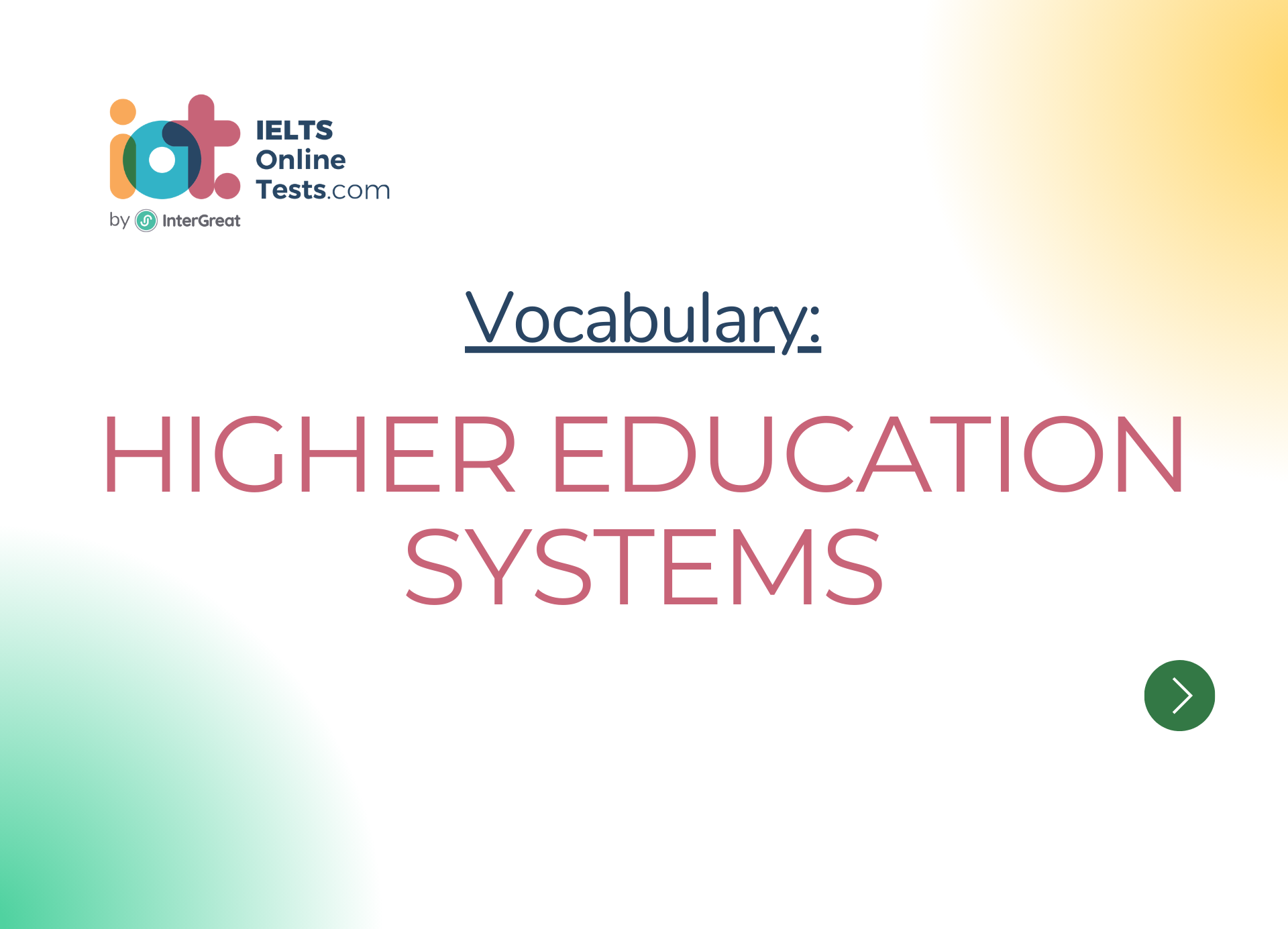
Higher education systems
Here are some vocabulary words related to higher education systems for the IELTS band score range of 4.5-6.0:
Higher Education
Education provided by universities, colleges, and institutions beyond secondary education.
University
An institution of higher education that offers undergraduate and postgraduate programs.
College
An institution that provides higher education and grants degrees, often focused on specific fields of study.
Degree
An academic qualification awarded by a university or college upon the successful completion of a program of study.
Bachelor's Degree
An undergraduate degree typically requiring three to four years of full-time study.
Master's Degree
A postgraduate degree that follows a bachelor's degree and typically requires one to two years of study.
Doctorate (Ph.D.)
The highest academic degree awarded by universities, indicating expertise in a specific field.
Undergraduate
A student pursuing a degree at the bachelor's level.
Graduate
A student pursuing a degree at the master's or doctoral level.
Academic Program
A structured course of study leading to a specific degree or qualification.
Major
The main field of study chosen by a student within their academic program.
Minor
A secondary field of study chosen by a student, typically requiring fewer courses than a major.
Course
An individual unit of study within an academic program.
Semester
A half-year academic term in a higher education institution.
Credit
A unit of measurement representing the hours of study required for a course.
GPA (Grade Point Average)
A numerical representation of a student's academic performance, calculated based on grades earned.
Enrollment
The process of registering and becoming a student at a higher education institution.
Tuition
The fee paid by students for instruction at a college or university.
Scholarship
Financial aid awarded to students based on academic merit, talent, or other criteria.
Financial Aid
Monetary assistance provided to students to help cover educational expenses.
Campus
The grounds and buildings of a university or college.
Student Union
An organization that represents the interests of students on campus.
Faculty
The academic staff of a university or college.
Research
The systematic investigation of a subject to discover new knowledge or insights.
Library
A collection of books, journals, and other resources for study and research.
Internship
A temporary position that provides practical work experience related to a student's field of study.
Extracurricular Activities
Activities and clubs outside of academic coursework that students can participate in.
Study Abroad
A program that allows students to study in a foreign country for a period of time.
Academic Advisor
A faculty member who provides guidance and support to students in their academic journey.
Academic Calendar
A schedule that outlines important dates and events for an academic year or semester.
Academic Transcript
A record of a student's academic performance, including grades and courses taken.
Academic Integrity
The ethical practice of honesty and integrity in academic work.
Plagiarism
Using someone else's work, ideas, or words without proper acknowledgment or permission.
Classroom
A room where lectures and discussions take place.
Lecture
A formal presentation on a specific topic delivered by a professor or instructor.
Tutorial
A small group session in which students discuss and review course materials with a tutor or instructor.
Assessment
The evaluation of a student's academic performance, typically through exams, tests, or assignments.
Graduation
The ceremony and process of completing a degree program and receiving a diploma.
Dissertation
A lengthy research project required for completion of a doctoral program.
Thesis
A research paper required for completion of a master's program.
Academic Journal
A periodical publication containing scholarly articles and research papers.
Peer Review
The process of evaluating academic work by experts in the same field.
Academic Conference
A gathering of scholars and researchers to present and discuss their work.
Distance Learning
Education that takes place remotely, often through online platforms.
Academic Writing
Formal writing that adheres to the conventions of academic discourse.
Plagiarism Detection Software
Software used by educational institutions to check for instances of plagiarism.
Graduate School
An advanced educational institution that offers postgraduate programs.
Alumni
Former students of an educational institution.
Remember that vocabulary alone is not enough for the IELTS exam. You also need to practice using these words in context and develop your overall English language skills in reading, writing, listening, and speaking. Good luck with your studies and IELTS preparation!




